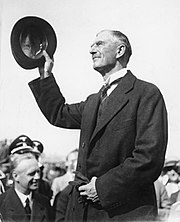Norway debate
Norway Debate (Engl. Norway Debate ) or Narvikdebatte (Engl. Narvik Debate ) referred to a parliamentary crisis in the House ( House of Commons ) during the Second World War . In the parliamentary sessions held on May 7 and 8, 1940, the conservative government was blamed for strategic failures that led to the occupation of Norway by the German Wehrmacht . The immediate result of the debate was the overthrow of Neville Chamberlain's government (1937–1940) and the formation of an all-party government under Winston Churchill (1940–1945) on May 10.
background
The beginning of the Second World War in Europe forms the historical background to the Norwegian debate. Great Britain and France , the guarantee powers of Poland , declared war on the German Reich in response to the attack on Poland on September 3, 1939, but remained militarily passive in the following months ( seated war ). Winston Churchill, appointed First Lord of the Admiralty by Prime Minister Neville Chamberlain in his war government after the outbreak of war , planned to cut off the German Reich from the war-essential Swedish ore supplies . Since these were mainly handled via the Norwegian port of Narvik , he wanted the country, regardless of its neutrality , to be occupied by British troops ( Operation Wilfred ). With the start of the Weser Exercise Company on April 9, 1940, the German Wehrmacht got ahead of the British landing forces.
course
On May 7th, Prime Minister Chamberlain reported to the House of Commons on the current military situation in Norway. When he declared that the Allied bridgeheads in central Norway did not have to be enlarged due to German air rule, but rather given up, a heated debate ensued. In view of the tense military situation, members of his own parliamentary group ( Leopold Amery , Duff Cooper , Roger Keyes ) as well as members of the Liberals ( David Lloyd George ) and the Labor opposition ( Clement Attlee ) accused him of inadequate planning and preparation as well as inadequate implementation of the Norwegian company in front. Finally, they broadened the focus of their criticism to the entire warfare and the failed appeasement policy and showered the conservative government with sharp accusations of negligence. Conservative MP Leopold Amery ended his speech with an appeal (originally addressed to the Rump Parliament by Oliver Cromwell ): “You have sat here too long for all the good you've done. Go, I say, in God's name, go ! " (You have sat too long here for any good you have been doing. Depart, I say, and let us have done with you. In the name of God, go!). Churchill, who had served on the government bench as Minister of the Navy (since the beginning of the war) tried to defend the Chamberlain administration, but gave - in the words of Dingle Foot - the "least convincing speech" of his parliamentary career.
In the vote on the adjournment of the House on May 8 - de facto, if not in terms of form, a vote of confidence - support for the government fell from the original 418 votes (when he took office in 1939) to 281 - a majority of only 81 Be right. Chamberlain decided on May 9th to draw the consequences of the vote and to resign. The most promising candidates for his successor were Churchill and Lord Halifax . Halifax, charged on the question of appeasement, gave way to Churchill, who presented his new government on the morning of May 10th. With Clement Attlee and Ernest Bevin , leading members of the Labor Party now joined the new government , which could rely on an all-party coalition.
Original text of the debate
The original text of the debate is available in Hansard (Shorthand Minutes of British Parliament Sessions): Fifth Series, Volume 360, Columns 1073–1196 and 1251–1366.
Individual evidence
- ↑ Cf. Raymond Cartier: The Second World War 1939/41 Volume 1 Munich 1967, p. 103.


